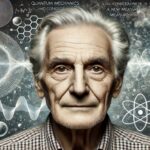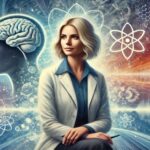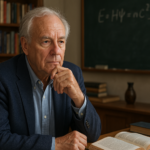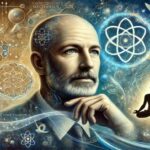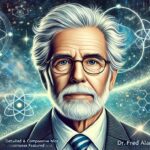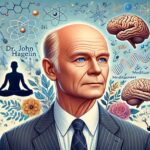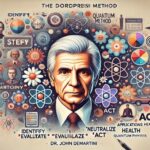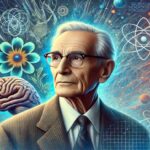Introduction to Quantum Mechanics and Consciousness Background and Motivation Quantum mechanics, the branch of physics that deals with the behavior of particles on the atomic and subatomic levels, has revolutionized our understanding of the universe. It challenges classical notions of determinism and introduces concepts such as wave-particle duality, superposition, and entanglement. These phenomena have not […]
Features
Explore the key principles and groundbreaking insights aimed at discovering the universe as a species by locating the ultimate missing link in solving the Quantum Conundrum. This category delves into the profound connection between consciousness and the physical realm, highlighting how traditions and science converge in their understanding. Uncover how quantum mechanics and ancient wisdom point to the non-physical and non-local as the source of everything. Our featured articles challenge the materialistic mindset and encourage expansive thinking to embrace the concept of "Nothing" as the foundation of all existence. Join us in bridging the gap between the physical and non-physical to unlock the mysteries of the universe.
A Question of Unity?
How Materialistic Science Limits Our Understanding of Reality In an era dominated by materialistic scientific thinking, the concept of unity seems elusive. This perspective, which views all things physical as composed of distinct parts, inherently creates division. Each part is unique and relative, lacking the universal sameness required for true unity. This materialistic mindset also […]
Dr. Lisa Miller: Exploring the Scientific Connection Between Consciousness and the Physical Universe
A Journey Through the Career, Concepts, and Contributions of Dr. Lisa Miller Dr. Lisa Miller is a distinguished figure in the realm of psychology and consciousness studies, whose pioneering work bridges the gap between scientific inquiry and spiritual understanding. Her extensive research delves into the intricate relationship between consciousness and the physical universe, offering […]
Dr. Lawrence M. Krauss: Unveiling the Cosmos from Nothing
A Comprehensive Biography of the Atheist Physicist’s Journey in Understanding the Universe and Consciousness Dr. Lawrence M. Krauss is a prominent theoretical physicist, cosmologist, and vocal atheist known for his work in understanding the origins of the universe and the concept of “something from nothing.” His contributions to science, his efforts to bridge the gap […]
Dr. Bernard Haisch, Ph.D.: Bridging Science and Consciousness
Unveiling the Cosmos: The Life and Work of Dr. Bernard Haisch, Ph.D. In the vast expanse of scientific inquiry, few have dared to tread the enigmatic paths that connect the physical universe with the realm of consciousness. Dr. Bernard Haisch, Ph.D., stands as a pioneering figure in this extraordinary journey. This blog post delves […]
Dr. Peter Russell: Bridging Consciousness and the Physical Universe
The Life and Legacy of a Pioneering Scientist, Philosopher, and Meditation Teacher Dr. Peter Russell is a renowned scientist, philosopher, and author whose work has profoundly influenced our understanding of consciousness and its relationship to the physical universe. His unique blend of rigorous scientific inquiry, deep philosophical insight, and dedication to meditation and spirituality has […]
Dr. Fred Alan Wolf: Bridging Consciousness and the Quantum Universe
A Biography of Dr. Fred Alan Wolf and His Quest to Understand Consciousness Through Quantum Mechanics In the realm of modern science, few names are as synonymous with the exploration of consciousness and quantum mechanics as Dr. Fred Alan Wolf. A physicist, author, and lecturer, Dr. Wolf has spent his career delving into the mysterious […]
Dr. John Hagelin: Bridging Consciousness and Physics
A Journey Through Education, Research, and the Unified Field of Consciousness Introduction Dr. John Hagelin stands as a pioneering figure at the intersection of physics and consciousness. His work seeks to unravel the mysteries of the universe by integrating the physical sciences with profound insights from the Vedic tradition. This blog post delves into Dr. […]
Dr. John Demartini: Bridging Consciousness and the Physical Universe
Exploring the Life, Work, and Impact of a Pioneer in Consciousness Research In the vast landscape of scientific exploration, few have managed to bridge the gap between consciousness and the physical universe as effectively as Dr. John Demartini. Renowned for his work in human behavior and personal development, Dr. Demartini has dedicated his career to […]
Dr. Jack Sarfatti: Bridging Consciousness and Quantum Mechanics
A Biography of a Revolutionary Thinker in the Realm of Science and Consciousness In the realm of modern physics and consciousness studies, few names stand out as prominently as Dr. Jack Sarfatti. Renowned for his groundbreaking work in attempting to bridge the gap between quantum mechanics and the nature of consciousness, Sarfatti has carved out […]
- « Previous Page
- 1
- 2
- 3
- 4
- 5
- …
- 18
- Next Page »

